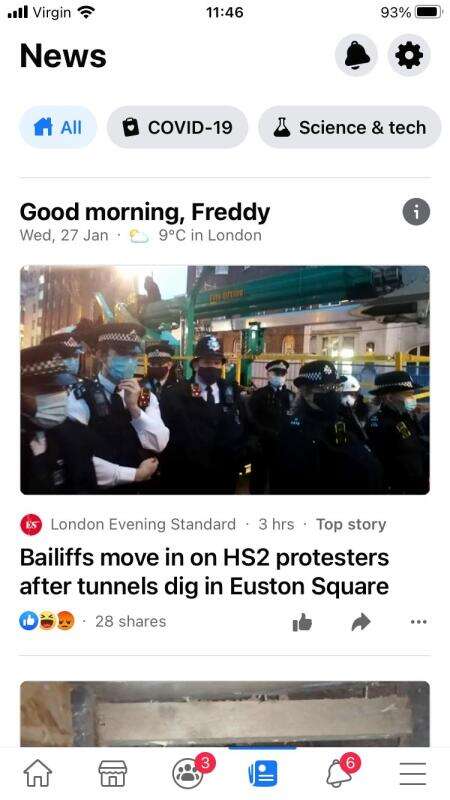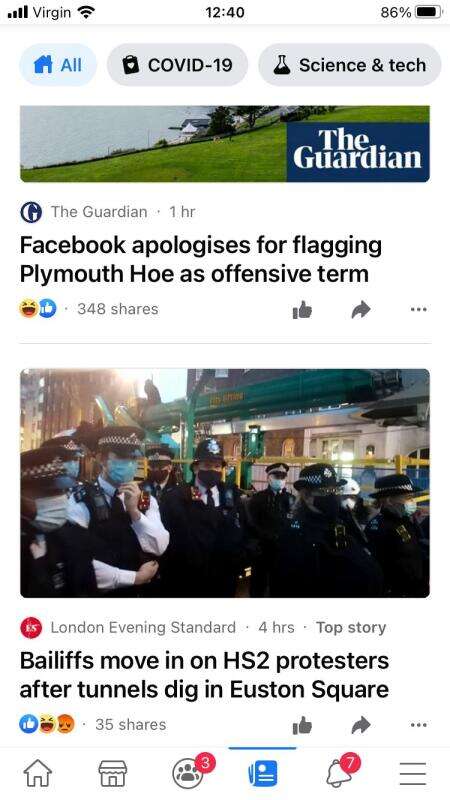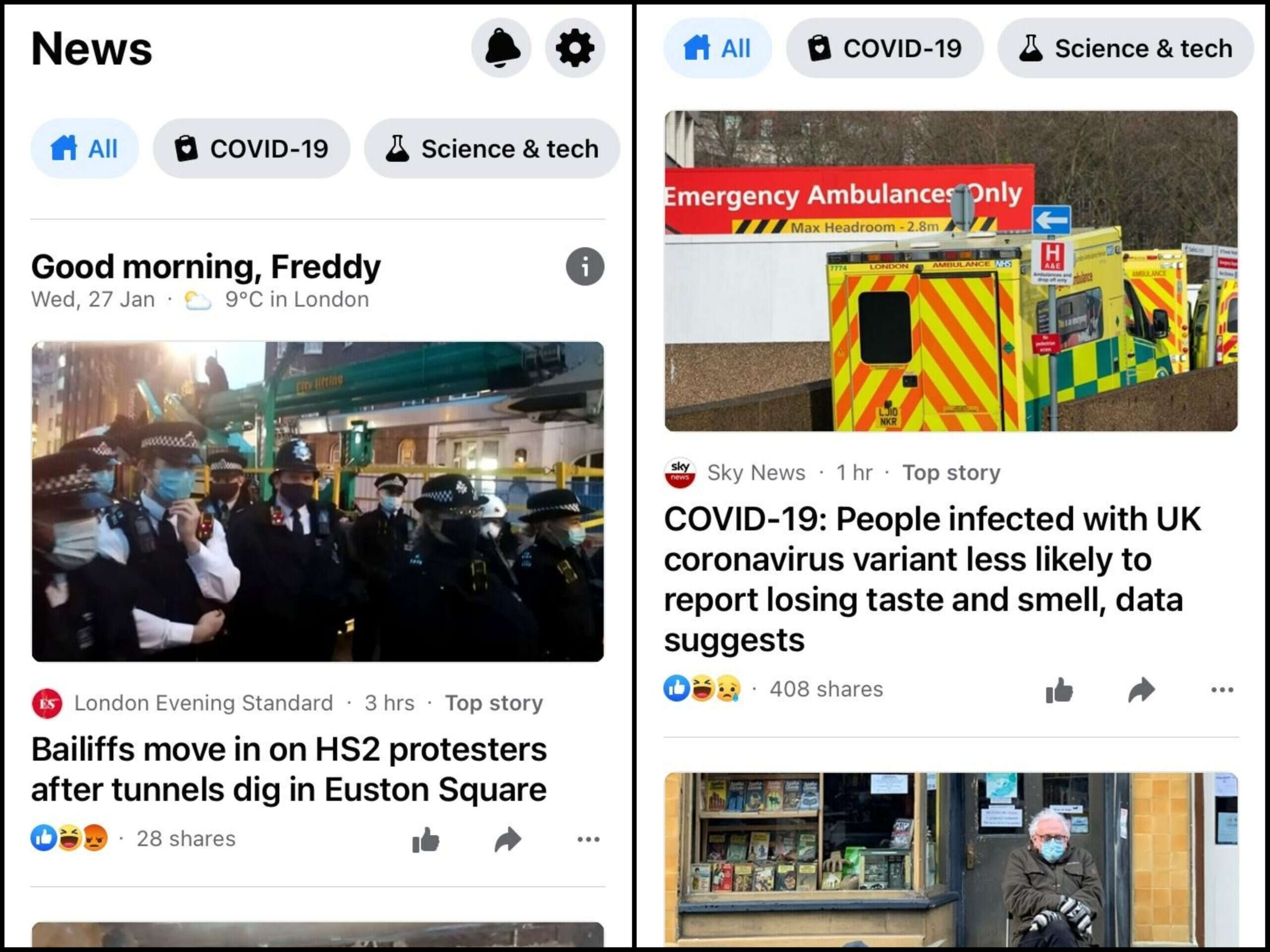
Facebook News, which launched in the UK this week, marks a step change in the social media giant’s relationship with publishers as it finally agrees to pay UK publishers directly for their content.
The move comes nearly four years after Press Gazette called for Facebook and Google to strike a fairer deal with the news industry with the launch of our Duopoly campaign.
Facebook has been reluctant to share much detail on the deals it has struck up with publishers or how the new commercial relationship works.
But Press Gazette understands that select number of invited partner publications are paid a flat fee for their content to appear in the “News” tab, a section which is separate from the traditional “News Feed” where a user’s family and friends share posts and pictures.
A number of big-name titles have signed up at launch, from national and regional newspapers to news magazines. News UK titles were absent from the launch announcement– and the publisher is keeping its lips sealed about why this is. Facebook has said some commercial conversations are ongoing.
[Read more: Facebook’s cash-for-content News scheme launches in the UK with most publishers on board]Facebook, which reported $70bn in revenue for 2019, described its payments to news publishers as a multi-year “investment”. Press Gazette understands Facebook is paying out millions as part of the arrangement, but the company hasn’t revealed any specific details.
Looking to the US, where Facebook News has been operational since 2019, it’s likely these payments are tiered, with bigger titles getting a larger share of the money. In the US, Press Gazette understands that the biggest titles are getting in excess of $1m a year to be part of Facebook News.
“If you’re a big part of the ecosystem… obviously that’s going to impact in a certain way,” said Sarah Brown, Facebook’s head of news partnerships for Northern Europe.
[Read more: Facebook News: US publishers happy with cash for content – but say project is a ‘PR move’]
Clicks will either take readers through to a publication’s own website, where publishers can serve their own ads, or Facebook Instant Articles, which are articles published entirely within Facebook where publishers can either sell direct ads (and keep 100% of the revenue) or take a revenue share from Facebook’s Audience Network ads.
Facebook News is not exclusive to the invited partner publications getting paid for their content, Brown said. “If they’re publicly posting content on Facebook, as long as they’re on the News Page Index and they are adhering to our integrity guidelines, their content is eligible to appear on Facebook News.”
News items can also continue to be posted to the News Feed as usual.
How Facebook News works
Facebook News uses an algorithm to personalise news content for users according to their preferences, but there is a team of humans involved as well. The social network is using the team at Upday, the news platform for Samsung phones run by German publisher Axel Springer, to curate the top two articles that appear on Facebook News.
[Read more: Platform Profile – Upday: Samsung’s curated news app drives traffic (but does not share revenue)]Facebook said there were “more than ten” people involved in the curation of UK content, with Facebook employees – former journalists – supervising the Upday team, but were reluctant to say more.
“We have a very stringent set of editorial guidelines that we try to adhere to,” said Brown, who said curation would involve “very close monitoring” of stories. Facebook has worked with Upday before – it runs the platform’s Covid Information hub. “We have a good relationship, they know how we work and we know how they work,” said Brown.
Subscription news websites, such as The Economist, have agreed to release a certain amount of paywalled content for Facebook News users each month. If an article is featured as one of the top two articles on the feed, it will be free to read for 24 hours, Press Gazette understands.
“It’s a big investment that we’ve worked extremely hard on with partners and we’ve done in a very collaborative way,” said Brown . “For us the important thing is that we’re providing users with an experience that’s diverse in terms of the content they’re seeing.
“We’re providing publishers with a chance to reach people that they would not necessarily reach before in the news ecosystem. I think that’s incredibly powerful, because that enables them [to reach] new users, new subscribers, new revenue streams, new ways to convert.
“I think that’s the most important part, but that’s what we’re really going to want to build on in the next few weeks. That and just ensuring the product works for the people on Facebook.”
The Duopoly
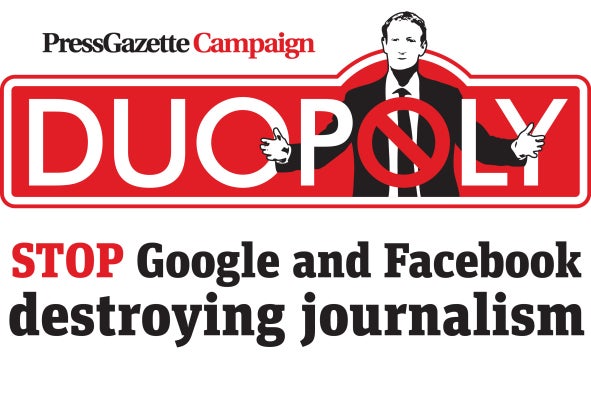
In the years since Press Gazette launched its Duopoly campaign, Facebook’s share of UK ad spend has only grown. Digital display ad spend reached £6.2bn in the UK in 2019, with Facebook taking a 60% market share, according to Emarketer, and 26% of total UK ad spend that year.
It has also faced increasing pressure over the spread of misinformation on its platform, with the Covid-19 pandemic heightening concerns as false claims about the virus – including that it was caused by 5G phone masts – were shared on social media.
Facebook News feels like the platform’s answer to both problems, and may be a case of it jumping before it is pushed. Through this new service, it is finally paying publishers direct for quality content and distinguishing it from the mass of dubious posts shared on the News Feed.
Brown said: “When we did research on Facebook News in the US, that’s how we realised…. that there was a large cohort of people on Facebook who really want to read news and [want it] served and delivered to them in a way that’s quality and in one place. So that’s what we decided to do.”
The News section includes a “Covid-19” tag, showing users stories on that topic, as well as tags for science and tech, entertainment, business, health and sport. Users can hide stories from a publication if they choose, but are limited to liking and sharing stories, with comments disabled.
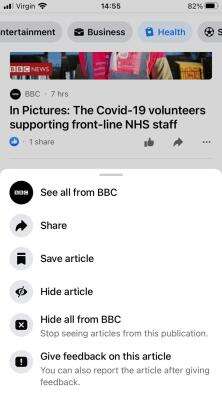
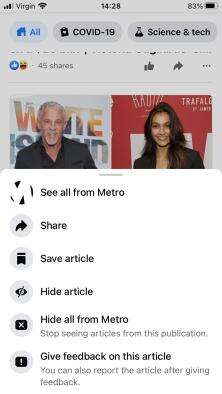
“Things like having a specific Covid-19 hub section is a really good way for us to ensure that people are seeing news from trusted news providers,” said Brown. “You won’t see false news within it because the integrity checks are put on it.”
She said that in the US, Facebook News had worked to expose users to more news content and more news publishers “than they may traditionally have interacted with” on the platform.
“I think one of the most exciting things we’ve seen with Facebook News in the US is that 95% of traffic for publishers has been from people who have not been connected to their Facebook pages, or who haven’t interacted with their content, for at least a month,” said Brown.
“So we’re seeing incremental increases in readership as a result of this product.”
UK news industry reacts to Facebook News launch
The launch of Facebook News in the UK has been seen as broadly positive for the news industry, with some concerns from smaller publishers that they’ll be left out.
The Conversation chief executive Chris Waiting said of the launch: “Facebook has struggled to keep pace with the misinformation on their platform – and while they’ve made sensible changes over recent years, they follow rather than lead.
“A dedicated space for high-quality news is welcome – it’s something that’s already working well for Apple, Samsung and others.
“While I welcome a curated space, as a smaller news publisher I hope they make space for publications like The Conversation rather than just allowing the same old familiar titles within their walled garden.”
[Read more: The Conversation chief exec Chris Waiting on how pandemic has boosted readership and revenue]Speaking at a Lords Digital Committee hearing on the future of journalism on Tuesday, Matt Rogerson, director of public policy at Guardian Media Group, said there were “some really good things” about the News tab, not least the fact that it directs traffic back to the Guardian’s own website.
“I think it’s good we have a news tab with credible news on there,” he said, adding it was an “important commitment” from Facebook not to take news out of its main news feed.
“It is important in the great traditions of media regulation in this country that pictures of cats are interspersed with high-quality news, so you get levity and seriousness in the same street.”
Asked if the revenue is meaningful, Rogerson said “yes, the terms were sufficiently in line with our expectations that we signed on a multi-year basis” adding that reports of Facebook paying multi-millions over multiple years sounded right.
But he linked Facebook’s motivations with the definite sense that “regulators are going to step in and force payments on content” in the coming months and years.
Peter Wright, editor emeritus at Mail, Metro and i publisher DMG Media, said: “The money is good enough to be worth doing a deal. It isn’t a complete game changer and I think it is important to stress that it’s a bespoke product which Facebook have created – they can turn it off, switch it on, add to it, subtract from it, as they wish.
“It isn’t payment for all the content that Facebook use across all their services, and it isn’t a Facebook core service in the way that their News Feed is, but it is most certainly a step in the right direction and we welcome it, and we will be very interested to see how it pans out and whether it delivers as promised.”
Gary Shipton, editorial director at Yorkshire Post and Scotsman publisher JPI Media, said: “Facebook News is a step in the right direction and anything which raises the profile of trusted news produced by professionals has got to be. But whatever we do it mustn’t distract us from [fighting for] a fair payment model.”
Ian Carter, editorial director at Iliffe Media, which has signed up with Facebook News, said on Twitter that it marked a “significant moment for UK media”, adding: “Payment for content has been a long time coming and this is a big step towards a new model for journalism.”
Dan Russell, head of social media and engagement at Reach, tweeted: “It has taken months to get across the line but it is here. Is it going to be good for publishers? Is it going to be industry defining? We will see. Is it a step in the right direction? Yes.”
Email pged@pressgazette.co.uk to point out mistakes, provide story tips or send in a letter for publication on our "Letters Page" blog

